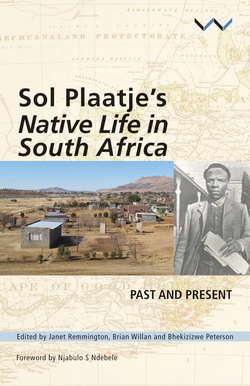Читать книгу Sol Plaatje's Native Life in South Africa - Jacob Dlamini - Страница 11
На сайте Литреса книга снята с продажи.
Native Life and the black intellectual tradition
ОглавлениеWhat place did Native Life and its author hold among black intellectuals of the day, and since? A week after Plaatje's passing, the journalist, poet and playwright H I E Dhlomo wrote ‘An Appreciation’ of his friend. In the short eulogy, Dhlomo described Plaatje as a
… great, intelligent leader; a forceful public speaker, sharp witted, quick of thought, critical; a leading Bantu writer, versatile, rich and prolific; a man who by force of character and sharpness of intellect rose to the front rank of leadership notwithstanding the fact that he never entered a secondary school; a real artist, passionate, assiduous, alert, keenly sensitive – such were the qualities of the late Mr Sol T Plaatje whose death will be deeply mourned in literary, social, political and religious circles throughout British South Africa.
Dhlomo concluded his tribute with the following statement: ‘Of his many achievements and understandings I leave it to better and more experienced pens to tell.’20 Dhlomo's esteem of Plaatje and his writing were generally shared by African intellectuals of the time and the appreciation of the person and his work is evident in the description that ‘… he is the author of the famous book Native Life in South Africa’.21 Native Life is referenced in a great variety of texts by black authors.22 In the 1950s annals of the history of the ANC, Z K Matthews acknowledges, in reference to the Land Act, that ‘the story of the hardships and the disabilities in land matters which that Act imposed upon African people is told by the then general secretary of the African National Congress, Solomon T Plaatje, in his well-known book Native Life in South Africa’.23 Plaatje's stature would remain relatively constant in the literary and cultural spheres that shaped African intellectual life and thought throughout the twentieth century, but his ideological perspective and style of writing elicited debate.24
In The African Image (1962), Es'kia Mphahlele addressed the relative tensions in disciplinary boundaries and expectations between history and literature that Plaatje and his oeuvre had to negotiate. After noting that Plaatje wrote of ‘the suffering caused by the new law … in bitter terms in his political work, Native Life in South Africa’, Mphahlele avers the following assessment of Plaatje's writing in Mhudi:
Perhaps Plaatje was too much of a historian, journalist and politician to visualise character independently of the historical events in which people were involved. But he had compassion, and this balanced the historian's detachment in him; his love for human beings was profound, and for this reason Mhudi comes alive even in the midst of epoch-making clashes, even if we consider her dialogue stilted.25
Responses to Plaatje's work have been broadly divergent, with some literary inclined readers such as Mphahlele finding the texts too much under the sway of history. Historians, for their part, have seemingly found that the literary influences do not fit with expected protocols of ‘evidence’ and ‘objectivity’ underpinning historiography. Then there have been those – across the humanities and social sciences – who, despite their sympathetic appraisals – have been troubled by what they have seen as Plaatje's Victorian paeans to the British Empire. Francis Meli, following on from A C Jordan, felt that for Plaatje and his generation ‘… the interconnection between colonialism and imperialism was not properly understood’.26
Major black scholars, however – whatever their differences in ideological outlook – held Plaatje in high regard. Many referenced the ‘prescience’ of the opening sentence of Native Life, lending it an affective power and a somewhat prophetic aura.27 In his memoir, the sociologist Bernard Magubane cites Native Life in recounting how ‘my grandmothers and my parents became squatters on the farm where … I was born’.28 The writer, editor and publisher Mothobi Mutloatse calls Plaatje ‘our pioneer historian’ and includes the first chapter of Native Life in a section of his anthology sub-headed as journalism.29 The popular literary magazine Staffrider references Plaatje a number of times and publishes Native Life's third chapter in one of its editions.30 Ellen Kuzwayo discusses Head's Foreword to the Ravan edition, describing Plaatje's book as ‘a powerful indictment of the beginnings of apartheid’.31 In Njabulo Ndebele's Noma Award acceptance speech, he describes Native Life as a landmark in the historiography on South African political repression: ‘The book is remarkable not only for its impressive detailing of facts but also for its well-considered rhetorical effects which express intelligent analysis, political clarity and a strong moral purpose.’32
Ndebele has on a number of occasions reflected on the singular significance of Plaatje and Native Life as a major intellectual and symbolic beacon. In the Noma speech, he reflects that in Native Life Plaatje is disturbed by the fact that the subjugation of Africans deprives them ‘of any meaningful, significant intellectual life’. With the white oligarchy defining and controlling most aspects of social and cultural life, black South Africans ‘seem doomed to respond and seldom to initiate’ and faced the prospect of being ‘reduced to the status of … mere bearers of witness’, a disempowering position to occupy.33 Ndebele highlights Plaatje's refusal to be a mere observer. By writing and publishing Native Life – a distinctive contribution to the public discourse and print culture of the time – Plaatje asserts agency in the sociopolitical and intellectual realm. In a complementary essay, Ndebele references Plaatje as a catalyst for, and an early example of, black writers and intellectuals taking up the responsibility of being ‘actors and interpreters' in South African society.34
